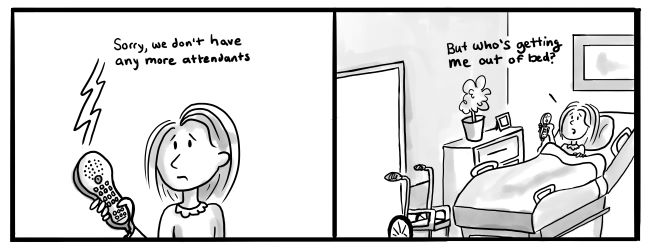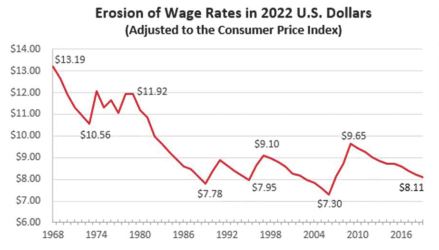Community Attendants
5.5 minute read
 Our Position
Our Position
Community attendants are a critical support for enabling people with disabilities and older adults to remain independent and in their chosen communities. Recruitment and retention of this crucial workforce is at high risk due to an extremely low base wage, no benefits, increasing demand, and alternative employers paying much higher wages.
Stabilizing this workforce comes down to a competitive wage, which is set by the Legislature.
In 2023, we recommended a base wage of $15 per hour. When the state budget went to conference committee, it looked like they might agree on $11. At the end of the day, though, the Legislature put the base wage of community attendants at $10.60 per hour.
This figuring is disappointing and woefully inadequate, and we will continue to fight for more. We are also encouraged, for two reasons:
- the budget conference committee took the Senate's methodology of raising the wage, which amounts to $2 billion into the pockets of attendants this biennium and another $2 billion carried forward in the next biennium's budget. This will put us in a stronger position to push for a competitive wage next session.
- this is the biggest increase the Legislature has ever given attendants by far.
The Latest
November 22, 2023: State House host Frank Santos and Dennis Borel talk healthcare, pharma, and Medicaid policy: The Challenges and Triumphs in Accessible Healthcare with Dennis Borel Part 1 (video)
June 12, 2023: Following the pay bump from the Texas Legislature, the Austin American-Statesman reports that Even with a 30% raise, Texas caregivers may qualify for food stamps.
April 3, 2023: Our Dennis Borel, plus advocates from Raise Your Voice! and our Advocacy Corps program in Elderly, disabled Texans wanting to stay in their homes threatened by low home care pay, a front page story from Dallas Morning News (paid subscription required).
March 8, 2023: two articles on attendant wages: Tens of thousands of disabled Texans await services for years from KXAN Austin and Battling Texas’ Community Care Crisis in D Magazine
Partners
- Personal Attendant Coalition of Texas (PACT) - ADAPT of Texas
Background
After decades of advocacy and changing attitudes, people with disabilities and older adults are better able than ever to be active in their communities and contribute to society. Much of this progress is due to community attendants, who assist their care-recipients with a wide variety of daily tasks in their own homes, allowing them to avoid unnecessary, expensive hospitalization or institutionalization.

Community attendants are the key to making cost-effective community services successful for approximately 302,000 individuals with disabilities and older adults in Texas, but our state is one of the worst in the country when it comes to supporting them. Thanks in part to advocacy efforts by CTD and our partners, the lowest paid attendants make $8.11 per hour in 2023, up from $8 per hour in 2019, $7.86 in 2015, and $7.25 in 2013 (the Legislature made no increase in 2017 or 2021). It's far from a livable wage. Plus, these workers receive no sick leave, no paid vacation, and no health insurance. In fact, the Texas Workforce Commission (TWC) won’t refer jobseekers to this high growth occupation: federal regulations require that job referrals lead to economic self-sufficiency and these jobs do not.
Demographic shifts underscore the urgency for a well-supported attendant work force. Texas has the third largest older adult population in the US, totaling 3.1 million in 2014 and projected to increase 90% by 2030 to 5.9 million. Many of these older adults will need attendant support and services in their later years, as do younger people with physical disabilities and/or intellectual and developmental disabilities.
With more and more people in these populations opting to age in place or stay in their homes, demand for attendant service will rise. TWC has already has identified personal care aides and home health aides as two of the fastest growing occupations in Texas. The increase in these jobs is projected to reach 94,000 by 2028.
As demand rises, a number of economic forces have an increasingly negative impact on the attendant workforce. For over 50 years, community attendants in Texas have seen their real wages decline. Wages have not kept up with inflation, undergoing a 35% erosion since 1968 (below).

Adjustments for inflation made using the Consumer Price Index Inflation Calculator, Bureau of Labor Statistics
Meanwhile, other entry-level jobs are paying more and even offering benefits, making alternative employment much more attractive. A quick drive around CTD's hometown of Austin reveals that El Tacorrido starts their employees at $17 per hour. Further out, Buc-ees starts at $16 and Amazon at $19, with benefits.
With better employment options elsewhere, it comes as no surprise that attendants are leaving the sector. In droves, it turns out: The Texas Health Institute reported a staggering 150% turnover rate in the industry, with average job tenure of only eight months.
All of these factors—a growing population that requires attendant services; decades of wage stagnation; attractive employment options elsewhere; high turnover—put Texas older adults and citizens with disabilities in a very precarious position. A wage increase will improve reliability and care which correlates to better health, less acute care, fewer ER visits, and fewer unnecessary institutionalizations.
In the ongoing COVID-19 world, it bears mentioning that 100% of the service population in community care falls within the group labelled “with underlying medical conditions”, the most likely to have a bad outcome, or death, from COVID-19. These citizens should avoid dangerous congregate settings like nursing homes and remain healthy enough to stay out of hospitals, which are highly risky for a non-COVID patient. Reliable community attendants provide excellent value to those served, their families and communities, and the state budget.
Further Reading
- CTD's report: Crushing the Workforce 2.0: Poverty Wages Undermine the Availability of Critical In-home Services for Seniors and People with Disabilities in Texas (updated in 2022)
- Opinion: Borel: Overlooked for years, public heath program faces collapse
- Article: Is The Shift Of Medicaid Long-Term Care From Nursing Facilities To Home About To Accelerate?


